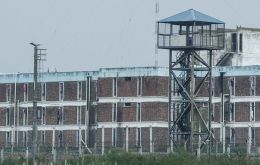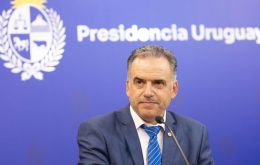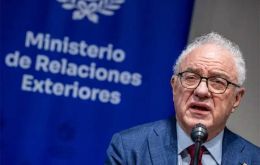MercoPress. South Atlantic News Agency
Uruguay
-
Monday, June 16th 2025 - 19:52 UTC
Four inmates killed in Uruguayan prison fire

Four inmates were killed Monday in a Montevideo jailhouse riot resulting in a fire, Uruguay's Interior Ministry confirmed. The casualties at the Santiago Vázquez Prison (Formerly known as Comcar) were aged 23, 27, 34, and 47, respectively, the authorities also acknowledged. The crisis started at approximately 1 pm when a fire broke out in a cell in Module 11 of Unit 4 following a confrontation between prisoner groups in nearby cells.
-
Monday, June 16th 2025 - 10:51 UTC
Uruguayan President insists on creating a Justice Ministry

Uruguayan President Yamandú Orsi defended his idea to create a Justice Ministry. Speaking at a press conference, Orsi noted that the idea was previously supported by multiple parties and was under discussion. The presidential proposal faces criticism from opposition legislators, particularly National Party Senator Javier García, who argued that current political conditions do not support the ministry, in addition to raising concerns about judicial independence
-
Friday, June 13th 2025 - 09:39 UTC
Uruguay and Venezuela agree to resume consular services

Uruguay and Venezuela agreed Thursday to resume consular services in both capitals, nearly a year after diplomatic relations deteriorated following Caracas' expulsion of Uruguayan diplomats alongside those of six other countries (Argentina, Chile, Costa Rica, Peru, Panama, and the Dominican Republic) for failing to recognize Nicolás Maduro's reelection as announced by the National Electoral Council (CNE) on July 28.
-
Tuesday, June 10th 2025 - 09:06 UTC
Uruguayan version of Milei's LLA launched

Little-known Uruguayan politician Nicolás Quintana Monday presided over the launch of the local version of La Libertad Avanza (LLA), Argentine President Javier Milei's party, which now has its own version across the River Plate.
-
Tuesday, June 10th 2025 - 08:54 UTC
Uruguay's political coexistence highlighted in Buenos Aires

Uruguayan President Yamandú Orsi, alongside former presidents Luis Lacalle Pou and Julio María Sanguinetti, received the Anne Frank Award in Buenos Aires for his country's democratic commitment, institutional respect, and peaceful coexistence. The trio arrived together on a private flight and attended the gala event downtown.
-
Saturday, June 7th 2025 - 10:21 UTC
Will Uruguay train Palestinians in sustainable agriculture?

from the West Bank in sustainable agriculture, Foreign Minister Mario Lubetkin announced in Montevideo Friday.
-
Friday, June 6th 2025 - 10:57 UTC
Uruguayan president and predecessors due together in Buenos Aires for Anne Frank Awards

Uruguayan President Yamandú Orsi and his predecessors, Luis Lacalle Pou and Julio María Sanguinetti, will be traveling to Buenos Aires next Monday to attend the Anne Frank Awards for Latin America. The awards, organized by the Anne Frank Center Argentina for Latin America (CAFA).
-
Thursday, June 5th 2025 - 10:05 UTC
Stolen Uruguayan aircraft ends up making emergency landing in Paraguay

A single-engined Cessna 206 airplane stolen from an Aeroclub in Rivera (Uruguay) ended up making an emergency landing in Paraguay after reportedly running out of fuel.
-
Wednesday, June 4th 2025 - 10:17 UTC
Uruguay expresses solidarity with Palestine

Foreign Minister Mario Lubetkin Tuesday conveyed to Palestinian Chargé d'Affaires Mohammed Shafei “the solidarity of the Uruguayan Government for the serious humanitarian crisis in Gaza as a result of the massacre, especially of the civilian population and the dramatic situation in the West Bank.” Lubetkin emphasized the urgency of an immediate ceasefire and a permanent two-state solution as the only path to lasting peace.
-
Tuesday, June 3rd 2025 - 13:45 UTC
Uruguayan faculty warns students score top grades with AI's help

Teachers at the University of the Republic's (Udelar) School of Psychology in Montevideo raised concerns about students using AI tools, like ChatGPT, in virtual tests, achieving perfect scores in just three minutes. In addition, over 75% of correct answers were recorded when compared to in-person exams.
